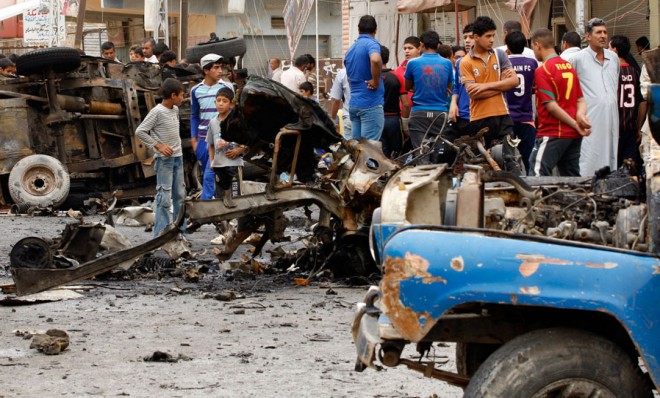Is Iraq heading toward civil war?
April was Iraq's bloodiest month in five years. And May isn't looking much better

A free daily email with the biggest news stories of the day – and the best features from TheWeek.com
You are now subscribed
Your newsletter sign-up was successful
Last Monday, at least 95 people died in a wave of attacks across Iraq. Two days before that, 76 people were killed in Sunni areas of Baghdad. And that followed a May 15 car bomb that kicked off a day of violence that resulted in 33 deaths.
The recent surge in violence has some experts warning of a return to 2006, when the country plunged into a sectarian conflict so brutal that it was often described as a civil war. What's behind the renewed violence?
Sunnis have rankled under what they have characterized as the heavy hand of Prime Minister Nouri al-Maliki's Shiite-led government. In December 2012, for example, government forces arrested Sunni Finance Minister Rafia al-Issawi and his staff, prompting large protests.
The Week
Escape your echo chamber. Get the facts behind the news, plus analysis from multiple perspectives.

Sign up for The Week's Free Newsletters
From our morning news briefing to a weekly Good News Newsletter, get the best of The Week delivered directly to your inbox.
From our morning news briefing to a weekly Good News Newsletter, get the best of The Week delivered directly to your inbox.
In April, at least 56 people died when a government-backed helicopter raid interrupted a Sunni protest in the northern city of Hawija. That set off a cycle of retaliatory attacks that has yet to abate.
However, while many have made the connection between the current violence and the sectarian bloodbath that started in 2006, most experts don't believe the country is there — yet. Shashank Joshi, a research fellow at the London-based think tank Royal United Services Institute, wrote at CNN that part of the reason Iraq has avoided all-out civil war is that the government is more stable now:
Does this mean that Iraq is fated to return to the dark days of 2006-2007, when death squads were run in the heart of government and Baghdad faced waves of ethnic cleansing? It is important to note that while Iraq itself bleeds, the Iraqi state is strong. Al-Maliki is vulnerable in Sunni-majority areas where the Sunni militias of the al-Sahwa movement provide security, but his large and cohesive security forces serve as a buffer against wider chaos. Moreover, many Sunni groups are eager to keep the violence in check, having previously suffered greatly at the hands of Al Qaeda in Iraq. [CNN]
Dan Murphy of the Christian Science Monitor also believes Iraqis are too war-weary to allow violence to overtake the country. Furthermore, bloodshed is bad for business, at least for the few government officials who are making money:
With all this, it's pretty easy to predict the worst. But Iraqis were so badly scarred by the sectarian civil war, with so much lost on every side, that it's hard to imagine the wildfire catching again soon. While average Iraqis have suffered due to a weak economy, both Shiite and Sunni political leaders have profited handsomely from high oil prices in recent years, and have little to gain from all-out warfare that would almost certainly end in the same result as last time: with the country's majority Shiite population still in the driver seat. [Christian Science Monitor]
However, the fact that Iraq's security situation has improved since 2006 doesn't mean it couldn't devolve further. How the government handles two delayed elections in Anbar and Nineveh, both majority Sunni provinces, could have serious implications for the security of the country. The elections have been rescheduled for July 4.
A free daily email with the biggest news stories of the day – and the best features from TheWeek.com
In addition, the civil war in Syria could also have a destabilizing effect on Iraq. In Foreign Policy, Ramzy Mardini notes that "Maliki has many reasons to fear [Syrian President Bashar al-Assad's] ouster," mainly because if Sunni opposition forces take power, they could rally with Sunnis in Iraq to form a "transnational sectarian cause aimed at removing Shiites from power."
Iraqi officials, for their part, insist that the country isn't heading towards a full civil war. "I'm not here to give you a rosy picture or to portray unrealistic picture," Iraqi Foreign Minister Hoshyar Zebari told CNN's Christiane Amanpour. "But the country is not crashing."
Keith Wagstaff is a staff writer at TheWeek.com covering politics and current events. He has previously written for such publications as TIME, Details, VICE, and the Village Voice.
-
 Switzerland could vote to cap its population
Switzerland could vote to cap its populationUnder the Radar Swiss People’s Party proposes referendum on radical anti-immigration measure to limit residents to 10 million
-
 Political cartoons for February 15
Political cartoons for February 15Cartoons Sunday's political cartoons include political ventriloquism, Europe in the middle, and more
-
 The broken water companies failing England and Wales
The broken water companies failing England and WalesExplainer With rising bills, deteriorating river health and a lack of investment, regulators face an uphill battle to stabilise the industry